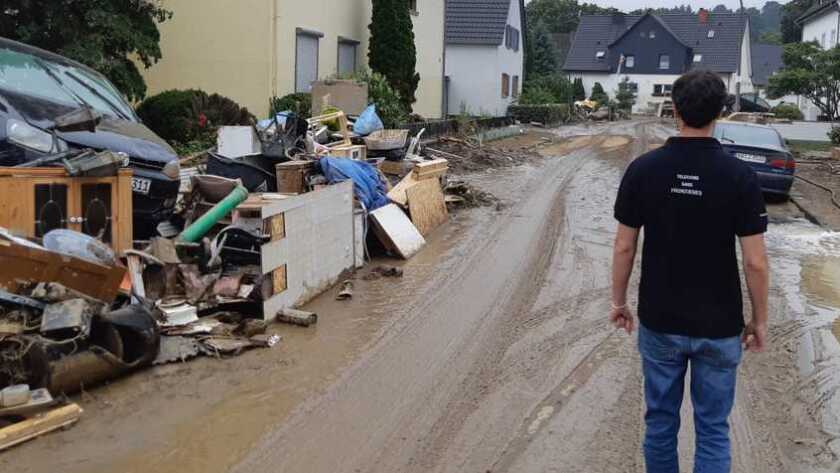Télécoms sans Frontières (TSF), which is supported by Capacity and a number of companies across the industry, deployed its people and equipment to two of the worst hit towns, Ahrweiler in Rhineland-Palatinate and Euskirchen in North Rhine-Westphalia. The floods also affected parts of Belgium and the Netherlands.
Monique Lanne-Petit, director of TSF, said: “The impact of the floods in western Europe has been catastrophic. The electricity and telecoms networks have been down or unstable for several days in different areas. Nineteen years after TSF’s last mission in Germany to provide support after the floods that hit the east of the country, it was of paramount importance for us to reach the most affected areas as soon as possible and assist the relief operations.”
She added: “We know that, in these cases, every minute counts, and the rescuers need all the support possible to reach isolated victims and save lives.”
A TSF official said: “In Ahrweiler, satellite lines have been provided to the local firefighters and all the other emergency responders including the Federal Agency for Technical Relief (THW), who are rescuing people in areas where the mobile networks have been cut off.”
In Euskirchen, following a request from the Red Cross, “our team installed a broadband satellite connection in their local office to support emergency operations”.
The city remained cut off from the rest of the world, without electricity and without telecoms networks, after the torrential rains and floods that hit the area.
By yesterday the death toll was 183 as efforts continued to find victims and clear the damage. Olaf Scholz, Germany’s finance minister, is expected to call for a €300 million aid package tomorrow.
TSF’s team went to the affected areas of Germany on Friday from their base in Pau in southern France. “TSF worked relentlessly over the weekend to provide telecoms support to the relief coordination mechanism,” said the organisation, whose industry supporters include AT&T, DigitalColony, Eutelsat, Inmarsat, Evox Trading, PCCW Global, Thales and Vodafone Foundation as well as Capacity.
Because the telecoms and power networks had collapsed, “it was extremely difficult for the relief organisations to contact the victims, search for missing people and coordinate their work”, said TSF. “TSF’s connection is particularly important for them to facilitate and speed up these operations.”
This is considered one of the worst natural disasters ever in Germany, said the organisation.
TSF is also active in Mexico, Syria, Madagascar and other parts of the world, despite the pandemic. Last year it deployed a team to Lebanon to help with the effects of the devastation caused by the explosion in Beirut port. It helped set up a call centre with local group Live Love Lebanon and the Beirut Relief Coalition to enable disaster victims to report their needs, whether they be medical, psychological or financial aid.
Readers can make a donation via PayPal to TSF, in euro, US dollars or UK pounds, here.






